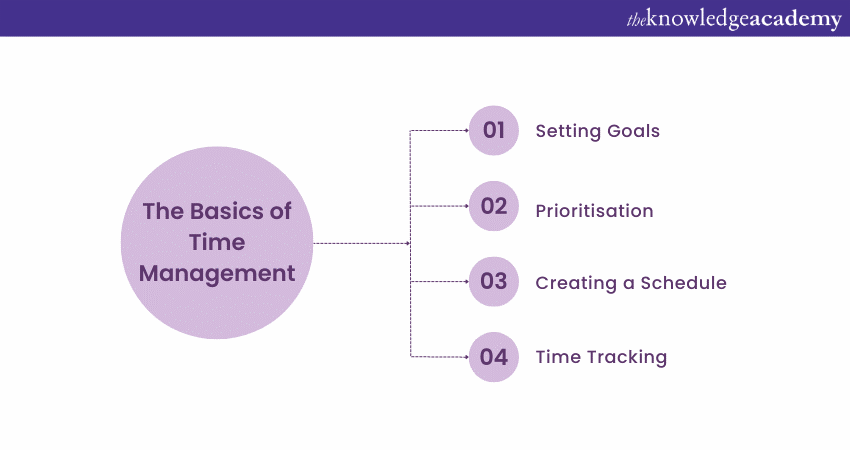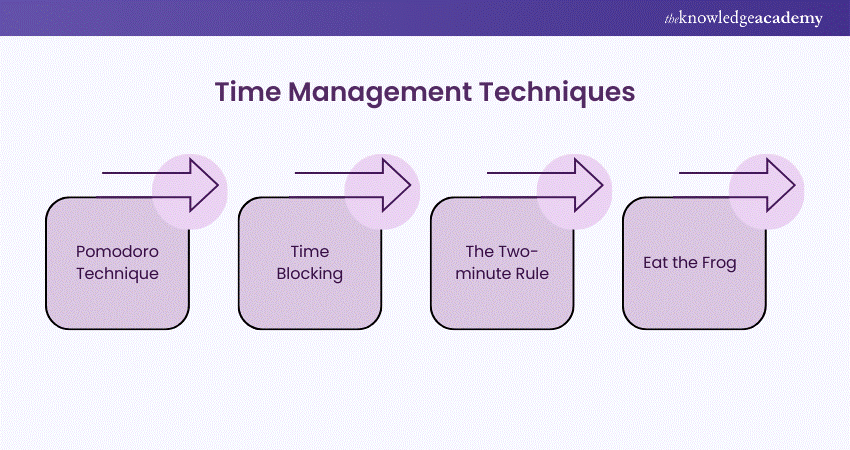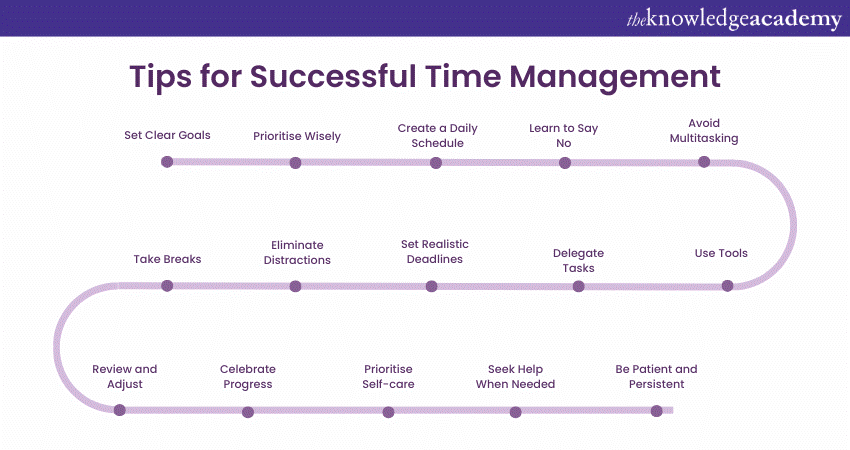We may not have the course you’re looking for. If you enquire or give us a call on 01344203999 and speak to our training experts, we may still be able to help with your training requirements.
We ensure quality, budget-alignment, and timely delivery by our expert instructors.

Time is a finite resource, and how we manage it can greatly impact our personal and professional lives. Time Management is an essential skill that helps us make the most of our limited time, ensuring that we achieve our goals and maintain a healthy work-life balance. In this blog, we will explore What is Time Management and the various techniques and tips for successful Time Management.
Table of Contents
1) Defining What is Time Management
2) The Basics of Time Management
3) Time Management Techniques
4) Consequences of Ineffective Time Management
5) Why is Time Management Important?
6) Tips for Successful Time Management
7) Conclusion
Defining What is Time Management
Before we delve deeper into the concept, we will first define Time Management. Time Management is the process of planning, organising, and prioritising tasks and activities to make the best use of your time. It involves setting goals, creating schedules, and making conscious choices about how to allocate your time to various tasks and responsibilities. Effective Time Management helps you accomplish more in less time while reducing stress and improving your overall quality of life.
The Basics of Time Management
Now that we know the definition of Time Management, we will explore its basics. This section of the blog will expand on the core components of Time Management.

1) Setting Goals
Setting goals is the bedrock of effective Time Management. It involves defining clear and specific objectives. Goals provide direction and purpose, helping you determine what you want to achieve in a given period. When setting goals, it's essential to be specific, measurable, and time-bound.
Specificity ensures you have a clear target, measurability allows you to track your progress, and time-bound goals provide a sense of urgency. Setting meaningful goals gives your daily tasks a purpose, making it easier to allocate your time effectively.
2) Prioritisation
Not all tasks are the same in terms of importance and urgency. Prioritisation is the art of identifying which tasks should take precedence. One valuable method for prioritising tasks is the Eisenhower Matrix.
It categorises tasks into four quadrants: urgent and important, important but not urgent, urgent but not important, and neither urgent nor important. This approach helps you allocate your time and energy to the most critical tasks, ensuring that you tackle what matters most first.
Ready to take your time and use it effectively, refer to our blog on Time Management Books
3) Creating a Schedule
Creating a schedule is the backbone of effective Time Management. It involves planning your day, week, or month to allocate time to various tasks and activities. A well-structured schedule ensures that you make efficient use of your time and minimises the risk of wasting it on unimportant activities.
When crafting your schedule, it's crucial to be realistic about the time each task will require. Include buffer time for unexpected delays and interruptions. Your schedule should also reflect your priorities, ensuring that important tasks receive adequate attention.
4) Time Tracking
Time tracking is a valuable tool for gaining insights into how you use your time. By recording the time, you spend on different activities, you can identify patterns and inefficiencies. It allows you to evaluate whether your time aligns with your priorities and goals.
Time tracking can be done manually or with the help of software and apps. Regularly reviewing your time tracking data helps you detect areas where you can improve your Time Management. It's a powerful tool for making informed decisions about how to optimise your daily routine and make the most of your precious time.
Want to master your time and unleash your potential? Join our Time Management Training today!
Time Management Techniques
This section of the blog will expand on some commonly used Time Management Techniques.

1) Pomodoro Technique
The Pomodoro Technique is a widely used Time Management method that encourages focused work and regular breaks. Here's how it works:
1) Firstly, choose a task that you want to work on
2) Set a timer for 25 minutes (a Pomodoro)
3) Work on the task with maximum concentration until the timer rings
4) Take a five-minute break
5) Once you have completed four Pomodoro's, take a more extended break of around 15-30 minutes
This technique is effective because it leverages the power of short, focused bursts of work followed by short breaks to maintain concentration and productivity.
2) Time Blocking
Time blocking involves allocating specific blocks of time for different tasks or activities throughout your day. It helps you structure your day more efficiently if you follow these steps:
1) Divide your day into blocks, each dedicated to a particular task or category of tasks
2) Assign high-priority or challenging tasks to your most productive times of the day
3) Include breaks and buffer time between blocks to prevent burnout and accommodate unexpected interruptions
By planning your day in advance and allocating time for each activity, you can maintain focus and prevent tasks from overflowing into one another.
3) The Two-Minute Rule
The Two-Minute Rule is a simple yet efficient technique for handling small tasks promptly. The idea is to deal with any task that can be completed in two minutes or less. By doing this, you prevent these minor tasks from accumulating and becoming overwhelming. This technique encourages efficiency and prevents procrastination.
4) Eat the Frog
"Eating the frog" means tackling your most challenging task first thing in the morning when your energy and willpower are at their peak. By addressing the most daunting task early, you set a productive tone for the rest of the day. Completing this task gives you a sense of major accomplishment and motivates you to tackle other tasks with renewed confidence.
Why is Time Management Important?
The Importance of Time Management are as follows:
1) Accomplish More with Less Effort: Efficient time management helps your complete tasks faster and with less effort.
2) Reduce Stress: Spending less time on activities lowers stress levels.
3) Enhance Focus: Good time management keeps you focused on important tasks.
4) Learn New Skills: Freeing up time allows you to learn and develop new skills.
5) Achieve Career Goals: Effective time management drives you to reach your career objectives and find success.
6) Increase Job Satisfaction: Managing your time well makes work more fulfilling and keeps you motivated.
7) Gain Recognition: Organisations value employees who meet deadlines and maintain high standards, qualities that align with the Stages of Value Management, leading to better advancement opportunities.
Consequences of Ineffective Time Management
Poor time management can lead to a cascade of negative effects, impacting your work. Let’s have a look at the consequences of ineffective Time Management:
1) Poor Workflow: Without planning, efficiency drops. For instance, tackling related tasks together boosts productivity, but without a plan, you might end up jumping between tasks, reducing efficiency.
2) Wasted Time: Distractions, like chatting on social media during assignments, lead to wasted time and hinder progress.
3) Loss of Control: Not knowing your next task can make you feel out of control, increasing stress and anxiety.
4) Poor Quality of Work: Rushing to meet deadlines often compromises the quality of your work, leading to subpar results.
5) Poor Reputation: Failing to meet deadlines can damage your reputation with clients and employers, who may then seek more reliable alternatives.
Tips for Successful Time Management
Effective Time Management is necessary for achieving goals and maintaining balance in life. Here are some tips to help you master this skill:

1) Set Clear Goals: Begin with well-defined, measurable objectives to give purpose to your tasks
2) Prioritise Wisely: Use tools like the Eisenhower Matrix to focus on what's most important and time-sensitive
3) Create a Daily Schedule: Plan your day realistically, allocating time blocks for various activities, including breaks
4) Learn to Say No: Avoid overloading yourself by declining tasks that can wait or are beyond your capacity
5) Avoid Multitasking: Concentrate on one particular task at a time to enhance efficiency and quality
6) Use Tools: Explore Time Management Tools, calendars, and lists to organise your work and deadlines
7) Delegate Tasks: Share responsibilities with team members when appropriate to free up your time
8) Set Realistic Deadlines: Avoid undue stress by setting achievable timeframes for your tasks
9) Eliminate Distractions: Identify and mitigate common interruptions in your workspace for focused work
10) Take Breaks: Regular pauses revitalise your mind and maintain productivity throughout the day
11) Review and Adjust: Periodically evaluate your Time Management Strategies and adapt to changing circumstances
12) Celebrate Progress: Acknowledge and reward your accomplishments to stay motivated
13) Prioritise Self-care: Ensure you get adequate sleep, exercise, and relaxation to sustain your well-being
14) Seek Help When Needed: If you struggle with Time Management, consult mentors or professionals for guidance
15) Be Patient and Persistent: Remember that mastering Time Management is an ongoing process requiring perseverance and adaptability
Ready to boost your productivity and master Time Management? Join our Productivity and Time Management Course today!
Conclusion
Time Management is a skill that can significantly improve your productivity, reduce your stress, and enhance your overall quality of life. By defining your goals, prioritising tasks, and implementing effective Time Management techniques and strategies, you can make the most of your limited time and achieve your desired outcomes. With dedication and practice, you can become a master of your time, achieving your goals and enjoying a balanced, fulfilling life. Hope we could answer all your queries about “What is Time Management”!
Unlock your true potential with our Personal Development Training - sign up now and get started on a transformative journey!
Frequently Asked Questions
What are the 5 Keys to Time Management?

The 5 Keys to Time Management are as follows:
1. Prioritise: Focus on urgent and important tasks.
2. Plan: Use calendars or to-do lists.
3. Set Goals: Define clear, achievable objectives.
4. Avoid Procrastination: Start tasks promptly.
5. Delegate: Share responsibilities when possible.
What is the Golden Rule of Time Management?

The golden rule is prioritised what matters most. Focus on tasks that align with your goals and values and allocate time effectively to achieve them. Prioritise tasks that reflect your goals and values, and manage your time wisely to accomplish them.
What are the Other Resources and Offers Provided by The Knowledge Academy?

The Knowledge Academy takes global learning to new heights, offering over 3,000 online courses across 490+ locations in 190+ countries. This expansive reach ensures accessibility and convenience for learners worldwide.
Alongside our diverse Online Course Catalogue, encompassing 19 major categories, we go the extra mile by providing a plethora of free educational Online Resources like News updates, Blogs, videos, webinars, and interview questions. Tailoring learning experiences further, professionals can maximise value with customisable Course Bundles of TKA.
What is The Knowledge Pass, and How Does it Work?

The Knowledge Academy’s Knowledge Pass, a prepaid voucher, adds another layer of flexibility, allowing course bookings over a 12-month period. Join us on a journey where education knows no bounds.
What are the Related Courses and Blogs Provided by The Knowledge Academy?

The Knowledge Academy offers various Personal Development Courses, including the Content Writing and Practitioner Course, and the Creative Writing Course. These courses cater to different skill levels, providing comprehensive insights into What is Emotional Resilience.
Our Business Skills Blogs cover a range of topics related to Journalism and Writing Courses, offering valuable resources, best practices, and industry insights. Whether you are a beginner or looking to advance your Business Management skills, The Knowledge Academy's diverse courses and informative blogs have got you covered.
Upcoming Business Skills Resources Batches & Dates
Date
 Time Management Training
Time Management Training
Fri 14th Mar 2025
Fri 9th May 2025
Fri 11th Jul 2025
Fri 12th Sep 2025
Fri 14th Nov 2025






 Top Rated Course
Top Rated Course



 If you wish to make any changes to your course, please
If you wish to make any changes to your course, please


